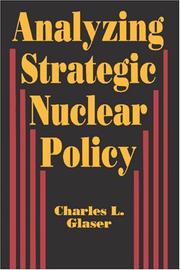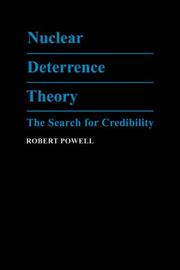| Listing 1 - 10 of 18 | << page >> |
Sort by
|
Book
ISBN: 1400862027 Year: 1990 Publisher: Princeton, New Jersey : Princeton University Press,
Abstract | Keywords | Export | Availability | Bookmark
 Loading...
Loading...Choose an application
- Reference Manager
- EndNote
- RefWorks (Direct export to RefWorks)
With sweeping changes in the Soviet Union and East Europe having shaken core assumptions of U.S. defense policy, it is time to reassess basic questions of American nuclear strategy and force requirements. In a comprehensive analysis of these issues, Charles Glaser argues that even before the recent easing of tension with the Soviet Union, the United States should have revised its nuclear strategy, rejecting deterrent threats that require the ability to destroy Soviet nuclear forces and forgoing entirely efforts to limit damage if all-out nuclear war occurs. Changes in the Soviet Union, suggests Glaser, may be best viewed as creating an opportunity to make revisions that are more than twenty years overdue. Glaser's provocative work is organized in three parts. "The Questions behind the Questions" evaluates the basic factual and theoretical disputes that underlie disagreements about U.S. nuclear weapons policy. "Alternative Nuclear Worlds" compares "mutual assured destruction capabilities" (MAD)--a world in which both superpowers' societies are highly vulnerable to nuclear retaliation--to the basic alternatives: mutual perfect defenses, U.S. superiority, and nuclear disarmament. Would any basic alternatives be preferable to MAD? Drawing on the earlier sections of the book, "Decisions in MAD" addresses key choices facing American decision makers.Originally published in 1990.The Princeton Legacy Library uses the latest print-on-demand technology to again make available previously out-of-print books from the distinguished backlist of Princeton University Press. These editions preserve the original texts of these important books while presenting them in durable paperback and hardcover editions. The goal of the Princeton Legacy Library is to vastly increase access to the rich scholarly heritage found in the thousands of books published by Princeton University Press since its founding in 1905.
Nuclear warfare --- Deterrence (Strategy) --- Nuclear warfare. --- United States --- Military policy.
Book
ISBN: 326104263X Year: 1990 Publisher: Bern Peter Lang
Abstract | Keywords | Export | Availability | Bookmark
 Loading...
Loading...Choose an application
- Reference Manager
- EndNote
- RefWorks (Direct export to RefWorks)
Nuclear warfare --- Strategy --- Terminology --- Terminology

ISBN: 0691023123 0691078289 Year: 1990 Publisher: Princeton (N.J.) Princeton University Press
Abstract | Keywords | Export | Availability | Bookmark
 Loading...
Loading...Choose an application
- Reference Manager
- EndNote
- RefWorks (Direct export to RefWorks)
Deterrence (Strategy). --- Nuclear warfare. --- United States --- Military policy.
Book
ISBN: 0465026621 Year: 1990 Publisher: New York Basic Books
Abstract | Keywords | Export | Availability | Bookmark
 Loading...
Loading...Choose an application
- Reference Manager
- EndNote
- RefWorks (Direct export to RefWorks)
Genocide --- Holocaust, Jewish (1939-1945) --- Nuclear warfare --- Psychological aspects. --- Psychological aspects --- United States --- Military policy --- Holocaust [Jewish ] (1939-1945) --- Nuclear warfare - Psychological aspects. --- United States - Military policy. --- Genocide - Psychological aspects. --- Holocaust, Jewish (1939-1945) - Psychological aspects.
Book
ISBN: 0946211965 Year: 1990 Publisher: Dublin Attic press
Abstract | Keywords | Export | Availability | Bookmark
 Loading...
Loading...Choose an application
- Reference Manager
- EndNote
- RefWorks (Direct export to RefWorks)
Disasters --- Nuclear warfare --- Women archaeologists --- Calamities --- Catastrophes --- Curiosities and wonders --- Accidents --- Hazardous geographic environments --- Fiction --- Ireland --- Fiction. --- English literature
Book
ISBN: 087840483X Year: 1990 Publisher: Washington (D.C.): Georgetown university press
Abstract | Keywords | Export | Availability | Bookmark
 Loading...
Loading...Choose an application
- Reference Manager
- EndNote
- RefWorks (Direct export to RefWorks)
Just war doctrine --- Nuclear warfare --- Peace --- Moral and ethical aspects --- O'Brien, William Vincent. --- Ramsey, Paul. --- Walzer, Michael.
Book
ISBN: 0312048459 Year: 1990 Publisher: New York St. Martin's Press
Abstract | Keywords | Export | Availability | Bookmark
 Loading...
Loading...Choose an application
- Reference Manager
- EndNote
- RefWorks (Direct export to RefWorks)
Book
ISBN: 2707119474 9782707119476 Year: 1990 Volume: vol *31 Publisher: Paris La Découverte
Abstract | Keywords | Export | Availability | Bookmark
 Loading...
Loading...Choose an application
- Reference Manager
- EndNote
- RefWorks (Direct export to RefWorks)
Strategie --- Strategy --- Stratégie --- Deterrence (Strategy) --- Nuclear warfare --- World politics --- Dissuasion (Stratégie) --- Guerre nucléaire --- Politique mondiale --- History --- Histoire --- United States --- Etats-Unis --- Military policy --- Politique militaire --- History. --- Dissuasion (Stratégie) --- Guerre nucléaire --- Deterrence (Strategy) - History - 20th century. --- Nuclear warfare - History. --- World politics - 1985-1995. --- World politics - 1945-1989.

ISBN: 0803939418 080393940X 9780803939417 Year: 1990 Volume: vol *2 Publisher: Newbury Park, California ; London ; New Delhi : Sage Publications,
Abstract | Keywords | Export | Availability | Bookmark
 Loading...
Loading...Choose an application
- Reference Manager
- EndNote
- RefWorks (Direct export to RefWorks)
This is an original contribution to the literature on how psychological factors influence the origins, processes and consequences of conventional and possibly nuclear war. The scope is broad, ranging from human aggression to the psychological dilemmas of deterrence. It will be of interest to professionals and advanced students in international relations and political science. Traditionally scholars of the international political system have assumed that wars serve national interests and that such decisions are based on rational means/ends calculations. Yet even political realists such as Hans J. Morgenthau have admitted that psychological analysis might shed further light on how nations behave. Psychological Dimensions of War analyzes how psychological factors influence the origins, processes, and consequences of conventional, and possibly nuclear, war. This original and thought-provoking volume brings together leading scholars, including Anatol Rapoport and George Quester, who analyze the psychology of both motivated and unmotivated biases of war behavior. With depth and insight, the contributors explore the interaction between political and psychological factors of war and use psychological variables to explain how emotions may have constructive as well as destructive results. In Part I the contributors analyze the biological, psychological, and ideological factors that are predispositions to war and in Part II they analyze the problems that governmental leaders encounter when managing contemporary, limited warfare. In Part III the contributors explore the factors that are most likely to lead to a nuclear conflict. An innovative contribution to the literature, Psychological Dimensions of War will interest professionals and advanced students in international relations, political science, peace studies, and psychology. "Over the past thirty years, such analyses [of foreign policy decisions which lead to war or peace] have emphasized, among other things, situational variables (e.g., crises), contextual variables (e.g., the organizational setting), perceptions of various sorts, and basic personality characteristics. This interesting book covers all these approaches to understanding the impact of psychological factors in war/peace decisions and ranges considerably beyond." --Perspectives on Political Science "Glad is to be congratulated for putting together a stimulating and enlightening collection of papers. . . .She (has) done a skillful job of editing, providing useful commentary on the various sections."
Atoomoorlog --- Guerre atomique --- Guerre nucléaire --- Kernoorlog --- Nucleaire oorlog --- Nuclear warfare --- Psychologie [Militaire ] --- Psychologie militaire --- Psychology [Military ] --- War --- Psychology, Military. --- Military history, Modern --- Nuclear warfare. --- Psychological aspects. --- Histoire militaire --- Psychologie militaire. --- Guerre --- Aspect psychologique. --- Psychological aspects --- Military history [Modern ] --- 20th century --- War - Psychological aspects. --- Military history, Modern - 20th century. --- Aspect psychologique

ISBN: 0521375274 052106399X 0511551592 0511831331 Year: 1990 Publisher: Cambridge : Cambridge University Press,
Abstract | Keywords | Export | Availability | Bookmark
 Loading...
Loading...Choose an application
- Reference Manager
- EndNote
- RefWorks (Direct export to RefWorks)
Applying advances in game theory to the study of nuclear deterrence, Robert Powell examines the foundations of deterrence theory. Game-theoretic analysis allows the author to explore some of the most complex and problematic issues in deterrence theory, including the effects of first-strike advantages, limited retaliation, and the number of nuclear powers in the international system on the dynamics of escalation. With the formalizations he develops, the author is able to demonstrate the fundamental similarity of the two seemingly disparate deterrrent strategies that have evolved in response to the nuclear revolution and the condition of mutually assured destruction: the strategy of limited retaliation. The author argues that the logic underlying both strategies centres on a search for ways to make the use of force or the threat of its use credible when any use of force might escalate to mutual devastation.
Deterrence (Strategy) --- Nuclear warfare --- 855.1 Strategie --- 872 Massavernietigingswapens --- 876 Veiligheidspolitiek --- Atomic warfare --- CBR warfare --- Nuclear strategy --- Nuclear war --- Thermonuclear warfare --- War --- Nuclear crisis control --- Nuclear weapons --- Military policy --- Psychology, Military --- Strategy --- First strike (Nuclear strategy) --- Nuclear crisis stability --- Social Sciences --- Political Science --- Nuclear warfare.
| Listing 1 - 10 of 18 | << page >> |
Sort by
|

 Search
Search Feedback
Feedback About
About Help
Help News
News